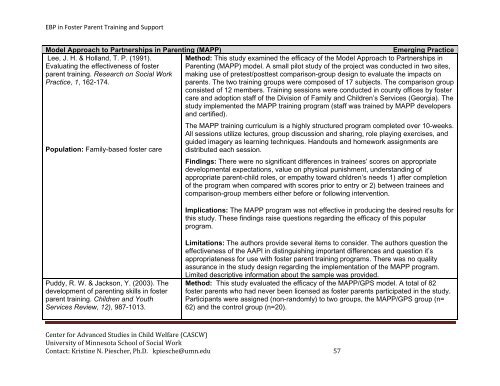Evidence-Based Practice in Foster Parent Training and Support ...
Evidence-Based Practice in Foster Parent Training and Support ...
Evidence-Based Practice in Foster Parent Training and Support ...
Create successful ePaper yourself
Turn your PDF publications into a flip-book with our unique Google optimized e-Paper software.
EBP <strong>in</strong> <strong>Foster</strong> <strong>Parent</strong> Tra<strong>in</strong><strong>in</strong>g <strong>and</strong> <strong>Support</strong>Model Approach to Partnerships <strong>in</strong> <strong>Parent</strong><strong>in</strong>g (MAPP) Emerg<strong>in</strong>g <strong>Practice</strong>Lee, J. H. & Holl<strong>and</strong>, T. P. (1991). Method: This study exam<strong>in</strong>ed the efficacy of the Model Approach to Partnerships <strong>in</strong>Evaluat<strong>in</strong>g the effectiveness of foster <strong>Parent</strong><strong>in</strong>g (MAPP) model. A small pilot study of the project was conducted <strong>in</strong> two sites,parent tra<strong>in</strong><strong>in</strong>g. Research on Social Work mak<strong>in</strong>g use of pretest/posttest comparison-group design to evaluate the impacts on<strong>Practice</strong>, 1, 162-174.parents. The two tra<strong>in</strong><strong>in</strong>g groups were composed of 17 subjects. The comparison groupconsisted of 12 members. Tra<strong>in</strong><strong>in</strong>g sessions were conducted <strong>in</strong> county offices by fostercare <strong>and</strong> adoption staff of the Division of Family <strong>and</strong> Children’s Services (Georgia). Thestudy implemented the MAPP tra<strong>in</strong><strong>in</strong>g program (staff was tra<strong>in</strong>ed by MAPP developers<strong>and</strong> certified).The MAPP tra<strong>in</strong><strong>in</strong>g curriculum is a highly structured program completed over 10-weeks.All sessions utilize lectures, group discussion <strong>and</strong> shar<strong>in</strong>g, role play<strong>in</strong>g exercises, <strong>and</strong>guided imagery as learn<strong>in</strong>g techniques. H<strong>and</strong>outs <strong>and</strong> homework assignments arePopulation: Family-based foster care distributed each session.F<strong>in</strong>d<strong>in</strong>gs: There were no significant differences <strong>in</strong> tra<strong>in</strong>ees’ scores on appropriatedevelopmental expectations, value on physical punishment, underst<strong>and</strong><strong>in</strong>g ofappropriate parent-child roles, or empathy toward chldren’s needs 1) after completionof the program when compared with scores prior to entry or 2) between tra<strong>in</strong>ees <strong>and</strong>comparison-group members either before or follow<strong>in</strong>g <strong>in</strong>tervention.Implications: The MAPP program was not effective <strong>in</strong> produc<strong>in</strong>g the desired results forthis study. These f<strong>in</strong>d<strong>in</strong>gs raise questions regard<strong>in</strong>g the efficacy of this popularprogram.Puddy, R. W. & Jackson, Y. (2003). Thedevelopment of parent<strong>in</strong>g skills <strong>in</strong> fosterparent tra<strong>in</strong><strong>in</strong>g. Children <strong>and</strong> YouthServices Review, 12), 987-1013.Limitations: The authors provide several items to consider. The authors question theeffectiveness of the AAPI <strong>in</strong> dist<strong>in</strong>guish<strong>in</strong>g important differences <strong>and</strong> question it’sappropriateness for use with foster parent tra<strong>in</strong><strong>in</strong>g programs. There was no qualityassurance <strong>in</strong> the study design regard<strong>in</strong>g the implementation of the MAPP program.Limited descriptive <strong>in</strong>formation about the sample was provided.Method: This study evaluated the efficacy of the MAPP/GPS model. A total of 82foster parents who had never been licensed as foster parents participated <strong>in</strong> the study.Participants were assigned (non-r<strong>and</strong>omly) to two groups, the MAPP/GPS group (n=62) <strong>and</strong> the control group (n=20).Center for Advanced Studies <strong>in</strong> Child Welfare (CASCW)University of M<strong>in</strong>nesota School of Social WorkContact: Krist<strong>in</strong>e N. Piescher, Ph.D. kpiesche@umn.edu 57
















